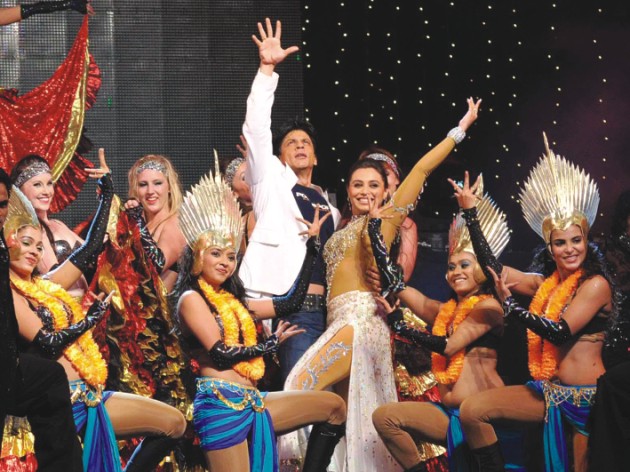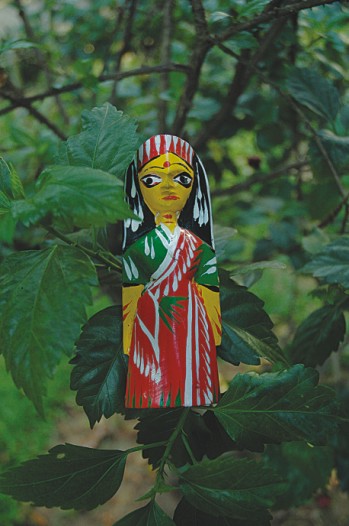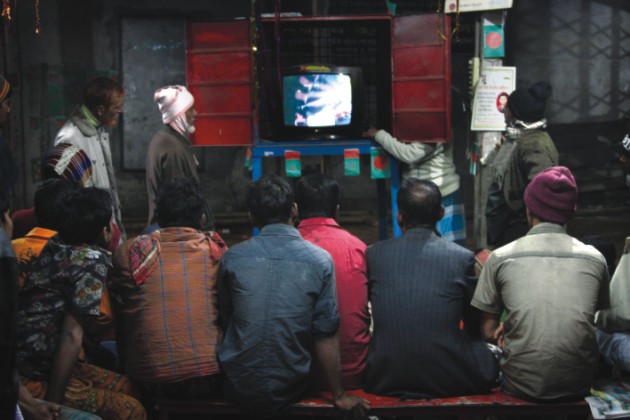
Inside
|
Bollywood Badshah and Bangladeshi Loyalists: SHAHANA SIDDIQUI muses on our passion for all things Bollywood and how it calls into question our national sensibility and identity.
King Power Rather, let me start with Friday December 10, 2010. It was in the truest sense a historical day. All that happened surrounding the events of that night summarises the state of confusion we are in as a nation as we start our 40th year of independence and state building. There was an excitement in the air that I have yet to see among my fellow countrymen for any other national days. That was the day when Bangladeshis saw the closest thing to modern world royalty -- the Badshah himself, Shah Rukh 'King' Khan! The new generation most probably felt more excited and was able to relate to that concert than to any event to commemorate 16th December. Everyone from the poor rickshaw puller who spent his entire family's monthly income for the cheapest tickets (Tk. 5000) to the richest epsilon paying a whopping Tk 25,000-1 lakh (approximately $357-$1430, in a country with a GDP per capita of $1500 and Human Development Index inequality valued at 0.331, reflecting on the high disparity between the rich and the poor) just to get a glimpse of the Bollywood Badshah. My own family room became a local cinema hall. Critical analysis and comments were made every two minutes: eta kono naach hoilo? eeesh, maiyya gulor ki phigure! and so on. And in their midst, my three-year-old danced more to Hit Pit Soniye than he ever did with any children's sing along, screaming at the top of his lungs "Maa, ami Shahrukh!" It did not, could not, stop there. We were a nation possessed. Even those who did not go, just could not stop ourselves from making snide comments, badgering the few friends who did attend the concert: tui shala actually dekhte gesos? shotti kore bol, tor bou niye gese naki tui nije nije gesos? We ridiculed the couple who went up on stage, and blasted Gazi Ilias, the character who apparently is now the face of embarrassment for 150 million Bangladeshis. Within hours, pro and anti Ilias groups were popping up on Facebook. The blogosphere was abuzz on the virulent reactions against Ilias and its representation of our fragile state of nationalism. Naeem Mohaiemen, writer and artist, posted on the Unheard Voice blog: A national ego crisis provoked by Gazi wanting to play out the role of the "funny sidekick" in Indian films -- drinking Shahrukh's water and not speaking in Hindi. Desh er number one crisis, why Gazi showed Bangalis to be "un-smart" in front of SRK? For this crime he is barraged with class warfare, inverted nationalism, homophobia, rape threats: "bangalipona", "kalker VILLAIN", "bolod", "ramchagoler theke o odhom", "mental protibondi", "stupid illiterate", "khati Bangali", "autistic beakkol", "street dog", "bosti", "Beyadop", "Fokirni", "faggot", "Divorce howa uchit", "ticket kenar taka koi pailo", "platinum ticket dilo kon shala!!!!!!", "Bangladesh er man ijjot TITANIC er moto dubaise"-- all on Facebook. http://unheardvoice.net/blog/2010/12/11/gazi-ilias/ My personal favourite was one Facebook group with the tagline: unless we change our education system, we will keep on producing Illias. Finally the Education Policy will be implemented, not because we need it desperately to improve the state of education and reach the MDG goals, but to ensure the next generation of "smart" Iliases who will not "embarrass" us in front of Bollywood celebrities. Yes, ladies and gentlemen, our national crisis and embarrassment is not power shortage or severe traffic congestion, or Transparency International's report on corruption, the state of Islam, or foreign policy, or national security, or the deterioration of human rights, but rather it is Gazi Illias and his "un-smartness" in front of King Khan. But why be so critical of my countrymen when by day I wear the pseudo-intellectual hat and overanalyse Shah Rukh Khan's visit and by night, I am in the song and dance committees of numerous friends' and families' weddings and other celebrations, teaching everyone from children to the grandparents how to zorke zatka! Collective schizophrenia The month we are to mourn and celebrate the sacrifices made for the independence gained 39 years ago, was the same month we publicly denounced a fellow countryman because he could not communicate in either Hindi or English (both of which are foreign languages for us). I almost have to thank Gazi Illias for his fumbling because that took the heat away from Professor Yunus, our only Nobel laureate, whom the entire nation was jumping on the defamation bandwagon based on some unknown, unheard Scandinavian filmmaker's documentary. While we struggle to find funding to operate national museums and restore heritage sites or even finish the construction of Shilpakala Academy, we found corporate and other unaccounted sources of funding to give Shah Rukh Khan Tk. 10 crores (approximately $150,000, and that's the official figure!) for two hours of mediocre performance by the performer's usual standards. I have heard firsthand accounts of people who paid for the Tk 25,000-1 lakh seats and did not get their assigned space because political party musclemen, police officers (deployed for security), and army officers took over the front rows. These are the defenders of our political processes and national sovereignty. As it happens, according to the Censorship of Films Act, 1963 we are not even supposed to be exposed to Bollywood and other foreign films. Political films face scrutiny and severe censorships because they are critical of Bangladesh and "tarnishes the image of the country" or are "insensitive to religious sentiments". When policymakers are openly proclaiming their love for Badshah Khan, do they realise they are in fact acquiescing to illegal distribution and viewing of foreign entertainment? Somehow Hindi/Bollywood is culturally acceptable because it is Indian and close to home. Ironically, while Bangladeshi and Western films and other media productions undergo severe censorship, other than the formal ban on film screening, Bollywood is completely exempted from any form of censorship and viewing guidance. For a nation obsessed with women's propriety and morality, we are all right with everyone from children to adults watching and dancing to Munnis and Sheilas. Of course, there is no badnaami there!
Speaking of women's attire, 2010 was the year we witnessed over 15 reported suicides of young girls across the nation because of sexual harassment. There has been a national outcry on the state of women's safety and respect in the society. We fought for change of terminology from "eve teasing" to sexual harassment. We continue to raise awareness with school authorities, government officials, law enforcers and community leaders to stop harassment of girls. We pushed for laws to be passed, implemented and for perpetrators to be duly punished. All these initiatives, yet they all come down to one thing -- what was the girl wearing? Apparently, some of us wear too much or too little of clothing, both having effects on the society's perception of how women/girls should be treated. We are a nation obsessed with what women wear. While the message is clear to young girls to retain their modesty so as to not to attract attention to ourselves (as if that will prevent sexual harassment), we are allowing scantily clad Caucasian dancers in SRK's troupe to shake it! Where were the fatwas and Prime Ministerial pearls of wisdom against the Badshah, his Rani, and the dancing harem? Bollywood -- The new cultural order What I have a problem with is US and our moral high ground when it comes to Bengali/Muslim identities which, in front of a Bollywood celebrity and market forces, disappeared instantly! I have a problem with our obsession with everything that is India. I have a problem with our lack of national pride and sensibility. I have a problem with our enthusiasm towards a foreign entertainer while we were quick to dismiss our homegrown, internationally recognised poverty reduction model and its founder. I have a problem that after 39 years, we are still struggling with an identity of our own that distinguishes us from other South Asian countries. History is political, but history need not be politicised. We have iconic figures and iconic days, which we glorify according to our petty, partisan needs of the day, demeaning and distorting the entire exercise of history writing and recording. I have a problem with our constant state of confusion and contradictions and replacing facts with fictions based on personal whims. I have a problem with us working on a five-year work plan and lacking any vision for the generations to come. I have a problem with our politics of blame game and personal vendettas that rise above national crises and priorities. I have a problem with using "it has been ONLY 39 years" excuse every time we are questioned on our pathways to progress. Most of all, I have a serious problem with what we will be handing over to the next generation. Seems like Bollywood is teaching our children more dance moves than we are on Bangladeshi history and culture. While many will say that the SRK show was merely a one-off show, the packed Army Stadium and the unaccounted millions of viewers of the live telecast across the country are reflective of a cultural hegemony that has set upon us with little resistance from our part. From my own field experiences, quite literally, protita grame gonje, children know the latest Bollywood hits. On the other hand, ask any 10th grader (of either Bangla or English medium) at any urban well-reputed school to write a two-page analytical essay on Sheikh Mujibur Rahman and his political philosophy, they will come to a screeching halt at memorised dates and events. Why? Because we do not teach our children history. Why our children, my own generation has limited knowledge of not only the historical facts but the history of Bangladeshi nationalism.
We have compromised on all the ideologies this country was founded on. Socialism is a distant memory that old Marxists tell us "ami jokhon communist party'r red card holder chhilam". The same Marxists' children, meaning us, are part of the capitalist manifesto, for whom socialism is a mere joke, a living failure that the old man reminisces about. And as for secularism, it has been reduced to a buzzword in crowd-pleasing speeches with immediate disclaimers "Islam is a liberal and peaceful religion" (as if that was ever the point of secularism!). Our parents' generation gave us a free country. But they failed, miserably, in state building and promoting national sensibility and pride. Freedom is more than a flag and the green passport with "People's Republic of Bangladesh" stamped on it. Freedom is how a nation retains its sense of independence. For all this time, in naivety, I believed that when my generation grows up, we will do something different, something better than the last one. Now we are grown up. We are now parents. What will we give our children? More Bollywood mauj masti? Shahana Siddiqui writes for Drishtipat Writers' Collective ww.drishtipat.org/dpwriters). She is a development practitioner and a very disheartened Bangladeshi who can be reached at dpwriters@drishtipat.org. |


